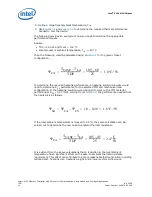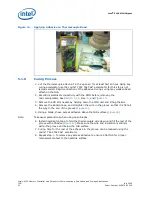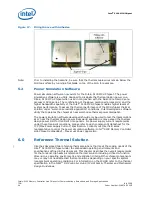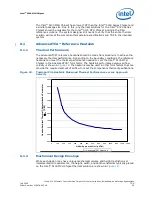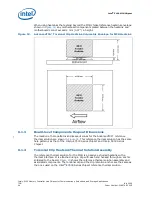
Intel
®
5100 Memory Controller Hub Chipset for Communications, Embedded, and Storage Applications
July 2008
TDG
Order Number: 318676-003US
13
Intel
®
5100 MCH Chipset
The case-to-local ambient thermal characterization parameter (
Ψ
CA
) is used as a
measure of the thermal performance of the overall thermal solution. It is defined by
Equation 1
and is measured in units of °C/W.
Equation 1. Case-to-local Ambient Thermal Characterization Parameter (
Ψ
CA
)
The case-to-local ambient thermal characterization parameter,
Ψ
CA
, is comprised of
Ψ
CS
, the thermal interface material (TIM) thermal characterization parameter, and of
Ψ
SA
, the sink-to-local ambient thermal characterization parameter.
Equation 2. Case-to-local Ambient Thermal Characterization Parameter (
Ψ
CA
)
Ψ
CS
is strongly dependent on the thermal conductivity and thickness of the TIM
between the heatsink and device package.
Ψ
SA
is a measure of the thermal characterization parameter from the bottom of the
heatsink to the local ambient air.
Ψ
SA
is dependent on the heatsink material, thermal
conductivity, and geometry. It is also strongly dependent on the air velocity through
the fins of the heatsink.
Figure 5
illustrates the combination of the different thermal
characterization parameters.
Example 1. Calculating the Required Thermal Performance
The cooling performance,
Ψ
CA,
is defined using the thermal characterization parameter
previously described. The process to determine the required thermal performance to
cool the device includes the following.
1. Define a target component temperature T
CASE
and corresponding TDP.
Ψ
CA
T
CASE
T
LA
–
TDP
-------------------------
=
Ψ
CA
Ψ
CS
Ψ
SA
+
=
Figure 5.
Processor Thermal Characterization Parameter Relationships
T
C
T
A
Ψ
CA
TIM
Device
T
S
Ψ
SA
Ψ
CS














